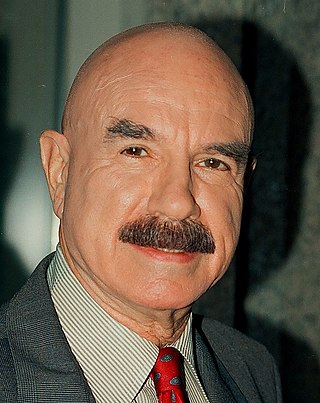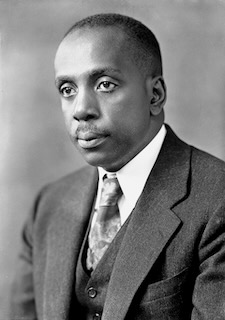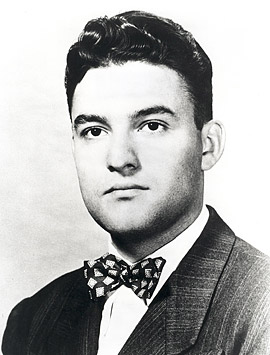
Holmes County is a county in the U.S. state of Mississippi; its western border is formed by the Yazoo River and the eastern border by the Big Black River. The western part of the county is within the Yazoo-Mississippi Delta. As of the 2020 census, the population was 17,000. Its county seat is Lexington. The county is named in honor of David Holmes, territorial governor and the first governor of the state of Mississippi and later United States Senator for Mississippi. Holmes County native, Edmond Favor Noel, was an attorney and state politician, elected as governor of Mississippi, serving from 1908 to 1912.

George Gordon Battle Liddy was an American lawyer and FBI agent who was convicted of conspiracy, burglary, and illegal wiretapping for his role in the Watergate scandal during the Nixon administration.

Howard Henry Baker Jr. was an American politician, diplomat and photographer who served as a United States Senator from Tennessee from 1967 to 1985. During his tenure, he rose to the rank of Senate Minority Leader and then Senate Majority Leader. A member of the Republican Party, Baker was the first Republican to be elected to the US Senate in Tennessee since the Reconstruction era.
Charles Hamilton Houston was an American lawyer. He was the dean of Howard University Law School and NAACP first special counsel. A graduate of Amherst College and Harvard Law School, Houston played a significant role in dismantling Jim Crow laws, especially attacking segregation in schools and racial housing covenants. He earned the title "The Man Who Killed Jim Crow".

Phylicia Rashad is an American actress. She is dean of the College of Fine Arts at Howard University and best known for her role as Clair Huxtable on the sitcom The Cosby Show (1984–1992) which earned her Emmy Award nominations in 1985 and 1986. She also played Ruth Lucas on Cosby (1996–2000). She was dubbed "The Mother of the Black Community" at the 2010 NAACP Image Awards.

Howard Washington Thurman was an American author, philosopher, theologian, mystic, educator, and civil rights leader. As a prominent religious figure, he played a leading role in many social justice movements and organizations of the twentieth century. Thurman's theology of radical nonviolence influenced and shaped a generation of civil rights activists, and he was a key mentor to leaders within the civil rights movement, including Martin Luther King Jr.

Sadie Tanner Mossell Alexander was a pioneering Black professional and civil rights activist of the early-to-mid-20th century. In 1921, Mossell Alexander was the second African-American woman to receive a Ph.D. and the first one to receive one in economics in the United States. In 1927, she was first Black woman to receive a law degree from the University of Pennsylvania Law School and went on to become the first Black woman to practice law in the state. She was also the first national president of Delta Sigma Theta sorority, serving from 1919 to 1923.
The Mississippi Plan of 1874 was developed by white Southern Democrats as part of the white insurgency during the Reconstruction Era in the Southern United States. It was devised by the Democratic Party in that state to overthrow the Republican Party in Mississippi by means of organized threats of violence and suppression or purchase of the black vote. Democrats wanted to regain political control of the legislature and governor's office. Their success in doing so led to similar plans being adopted by white Democrats in South Carolina and other majority-black states.
The civil rights movement (1896–1954) was a long, primarily nonviolent action to bring full civil rights and equality under the law to all Americans. The era has had a lasting impact on American society – in its tactics, the increased social and legal acceptance of civil rights, and in its exposure of the prevalence and cost of racism.

John Mercer Langston was an American abolitionist, attorney, educator, activist, diplomat, and politician. He was the founding dean of the law school at Howard University and helped create the department. He was the first president of what is now Virginia State University, a historically black college. He was elected a U.S. Representative from Virginia and wrote From the Virginia Plantation to the National Capitol; Or, the First and Only Negro Representative in Congress From the Old Dominion.

Jack Greenberg was an American attorney and legal scholar. He was the Director-Counsel of the NAACP Legal Defense Fund from 1961 to 1984, succeeding Thurgood Marshall. He was involved in numerous crucial cases, including Brown v. Board of Education, which ended segregation in public schools. In all, he argued 40 civil rights cases before the U.S. Supreme Court, and won almost all of them.

Benjamin Jefferson Davis Jr., was an African-American lawyer and communist who was elected in 1943 to the New York City Council, representing Harlem. He faced increasing opposition from outside Harlem after the end of World War II. In 1949 he was among a number of communist leaders prosecuted for violating the Smith Act. He was convicted and sentenced to five years in prison.

Wayne Allyn Root is an American conservative television and radio host, author, activist, conservative political commentator and conspiracist. He is the host of two new television shows, daily at 7 PM ET on Lindell TV network (FrankSpeech.com) and Saturdays at Noon ET "America's Top Ten Countdown with Wayne Allyn Root" on Real America's Voice TV Network. He is also the radio host of "Wayne Allyn Root: Raw & Unfiltered" on AM 670 in Las Vegas and nationally-syndicated on the USA Radio Network, and formerly on Newsmax TV. Root was an opinion columnist for the Las Vegas Review-Journal. His newspaper columns are currently nationally syndicated on Sundays by Creators Syndicate.

John Anthony Copeland Jr. was born free in Raleigh, North Carolina, one of the eight children born to John Copeland Sr. and his wife Delilah Evans, free mulattos, who married in Raleigh in 1831. Delilah was born free, while John was manumitted in the will of his master. In 1843 the family moved north, to the abolitionist center of Oberlin, Ohio, where he later attended Oberlin College's preparatory division. He was a highly visible leader in the successful Oberlin-Wellington Rescue of 1858, for which he was indicted but not tried. Copeland joined John Brown's raid on Harpers Ferry; other than Brown himself, he was the only member of John Brown's raiders that was at all well known. He was captured, and a marshal from Ohio came to Charles Town to serve him with the indictment. He was indicted a second time, for murder and conspiracy to incite slaves to rebellion. He was found guilty and was hanged on December 16, 1859. There were 1,600 spectators. His family tried but failed to recover his body, which was taken by medical students for dissection, and the bones discarded.

This is a selected bibliography of the main scholarly books and articles of Reconstruction, the period after the American Civil War, 1863–1877.
Gregory Howard Williams is a scholar, attorney, law school professor, author, and formerly the 27th President of the University of Cincinnati and the 11th President of the City College of New York (2001–2009).
The civil rights movement (1865–1896) aimed to eliminate racial discrimination against African Americans, improve their educational and employment opportunities, and establish their electoral power, just after the abolition of slavery in the United States. The period from 1865 to 1895 saw a tremendous change in the fortunes of the black community following the elimination of slavery in the South.
Howard Kennedy Beale was an American historian. He had several temporary appointments before becoming a professor of history at the University of North Carolina in 1935. His most famous student was C. Vann Woodward, who adopted the Beard-Beale approach to Reconstruction. He went to the University of Wisconsin in 1948, where he directed many dissertations. He specialized in nineteenth and twentieth-century American history, particularly the Reconstruction Era, and the foreign policy of the early 20th century. He was a noted civil libertarian and advocate for academic freedom.

Philip Jacob Weiser is an American lawyer and politician who has served as the 39th Attorney General of Colorado since 2019. He is the Hatfield Professor of Law and Telecommunications, executive director and Founder of the Silicon Flatirons Center for Law, Technology, and Entrepreneurship, and Dean Emeritus at the University of Colorado Law School. He previously served in the Obama and Clinton Administrations in the White House and Justice Department. A member of the Democratic Party, he was elected Attorney General for the State of Colorado in the 2018 election, defeating Republican George Brauchler on November 6, 2018. He was re-elected in 2022.

James Dean was the first black American judge elected in Florida after Reconstruction. Dean was born in Ocala, Florida. He graduated from Cookman Institute and Howard University and actively participated in the political world and in his religious faith. He was a county judge in Monroe County, Florida until Florida governor Francis P. Fleming removed him from office. He was removed from office without a hearing after he married a Cuban couple, allegedly in violation of miscegenation laws. He was restored in good standing posthumously in 2002 by Florida governor Jeb Bush.














